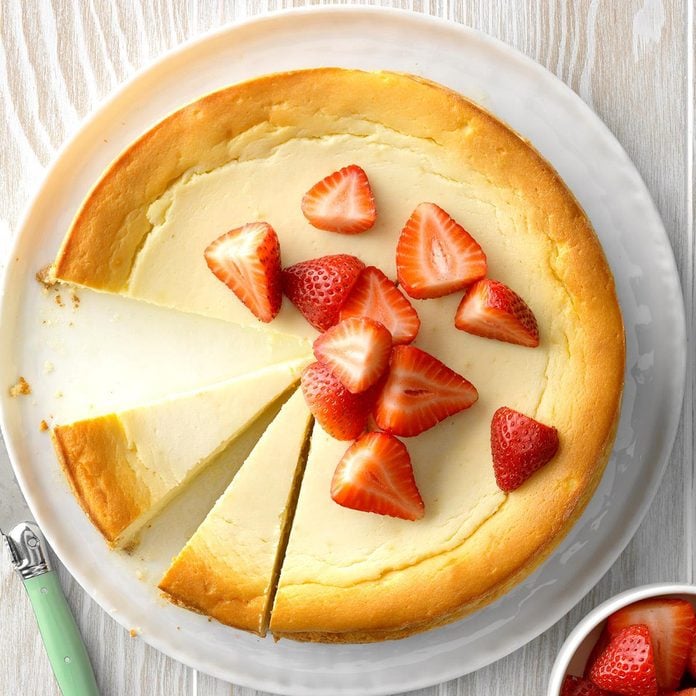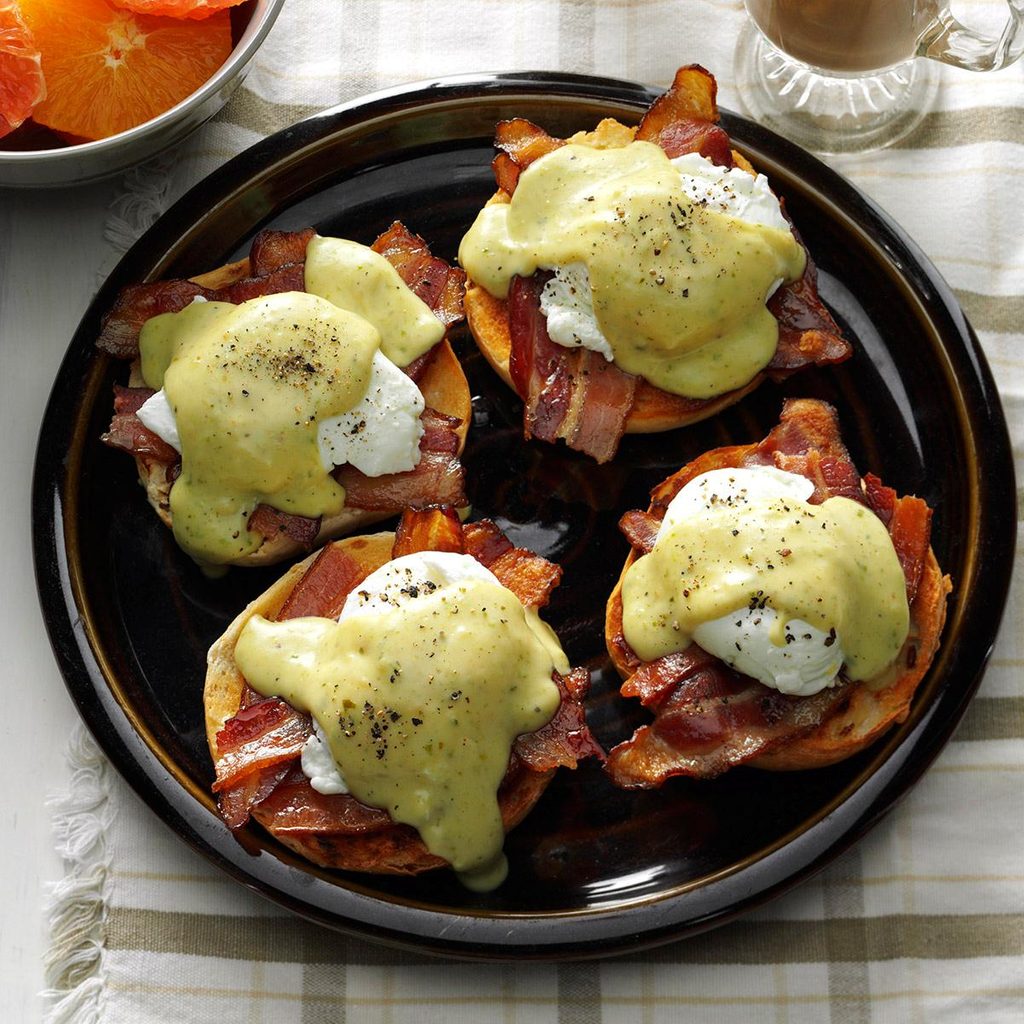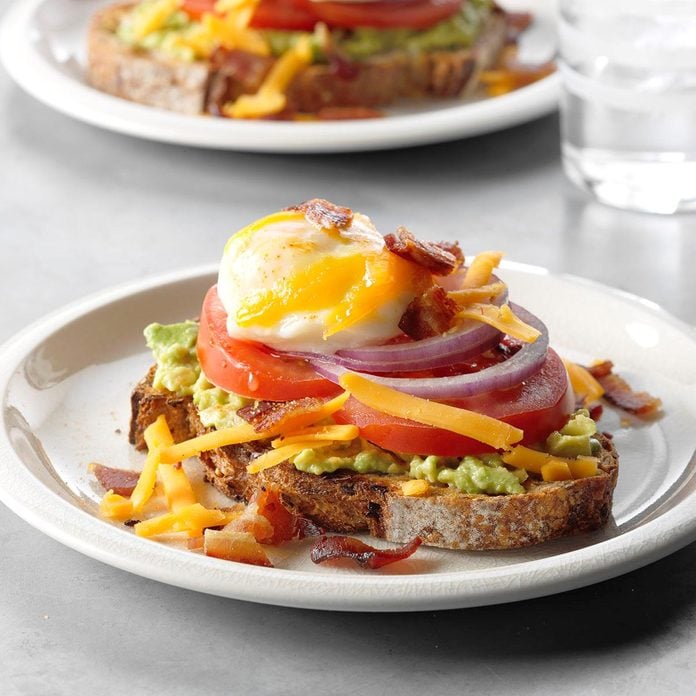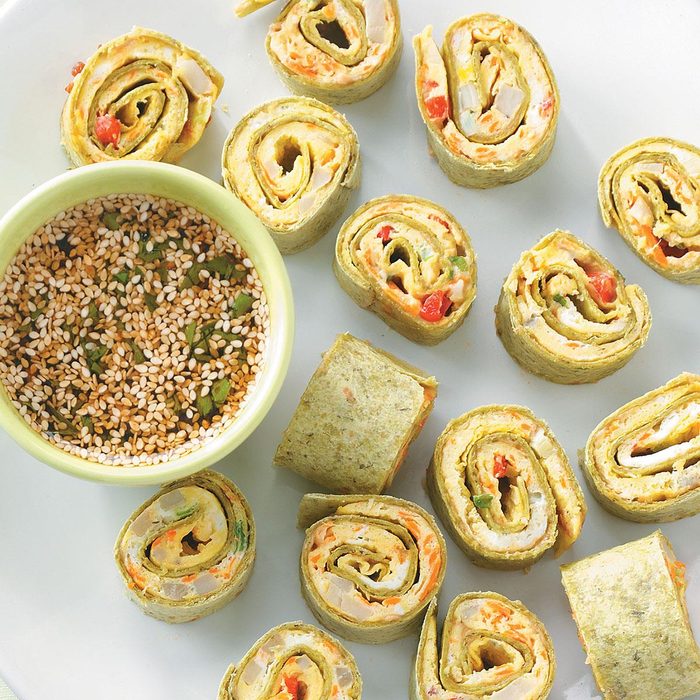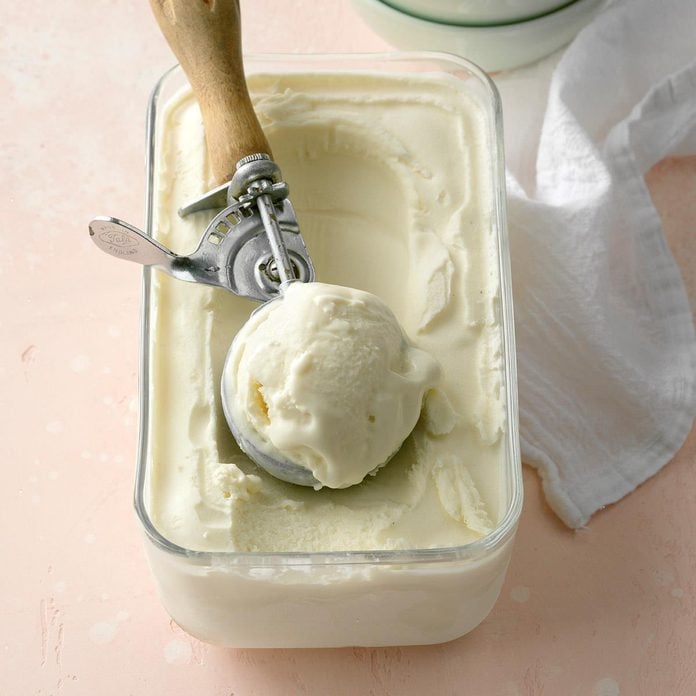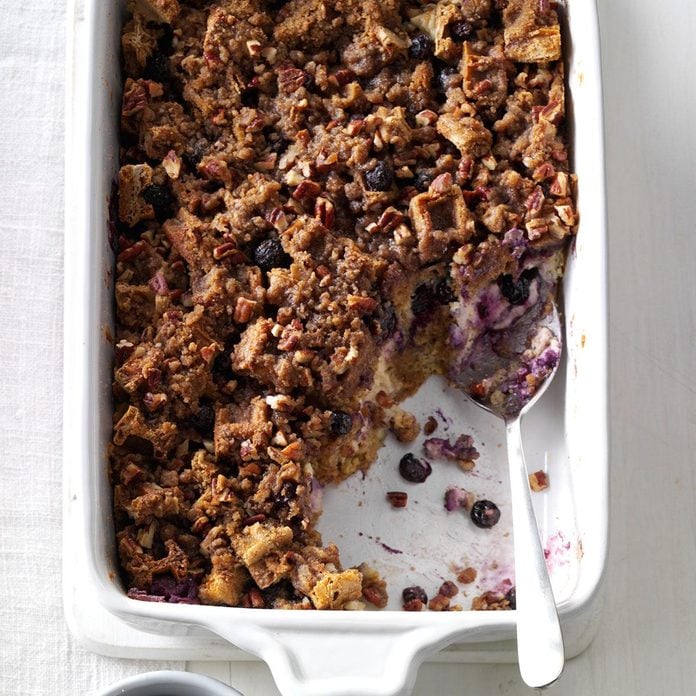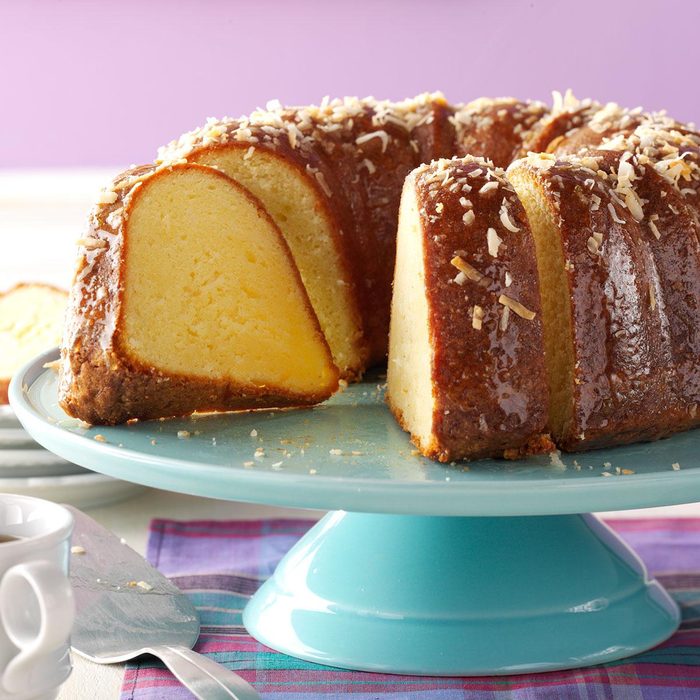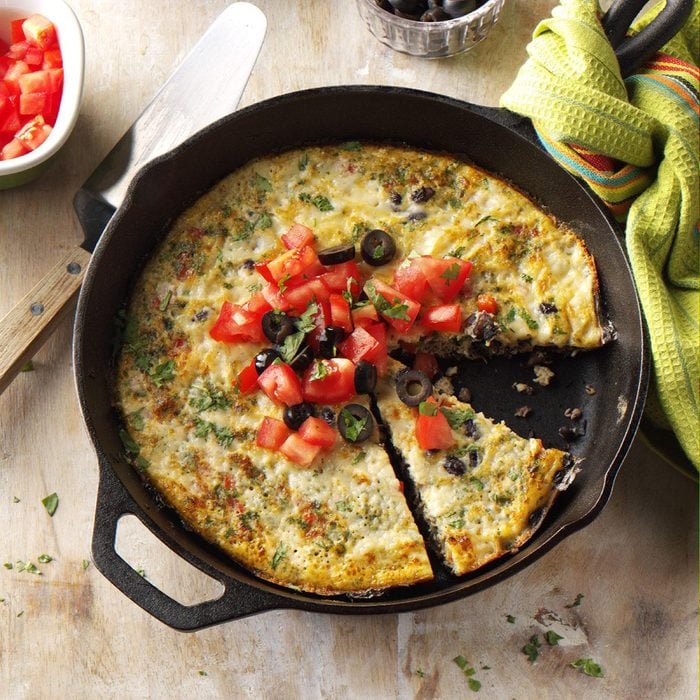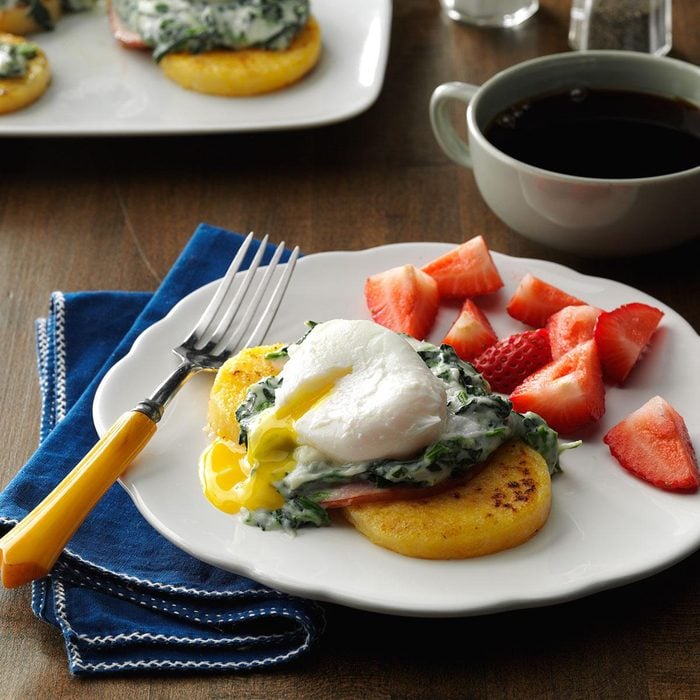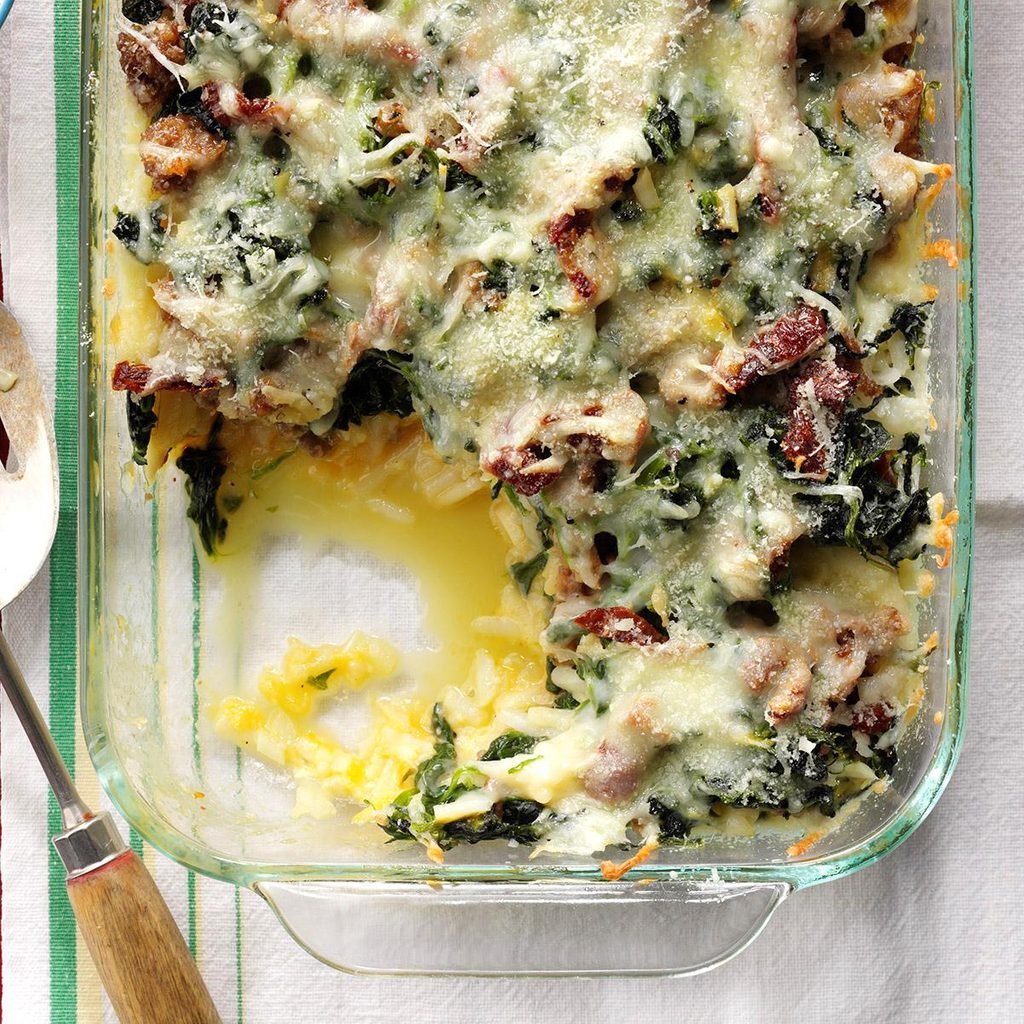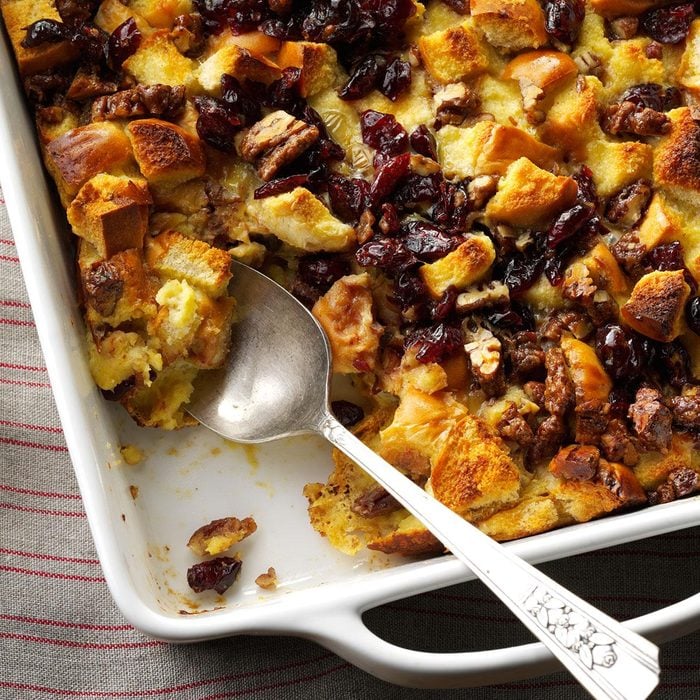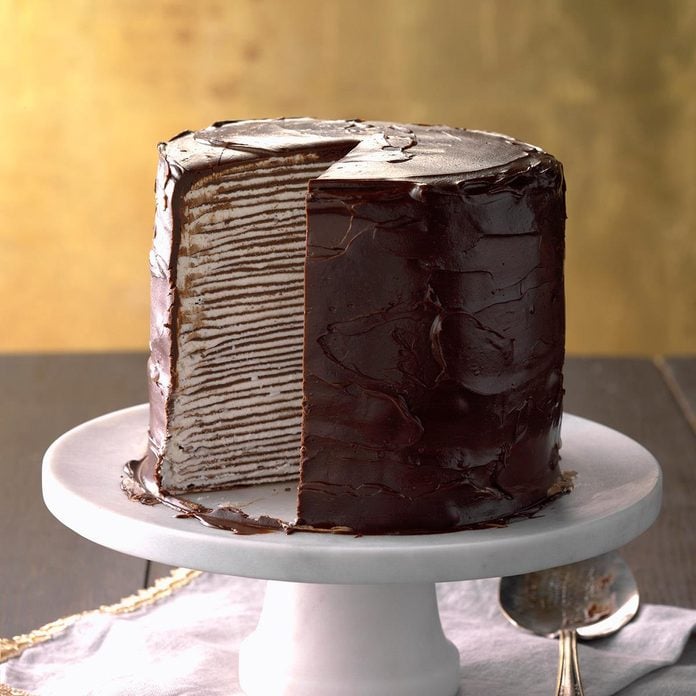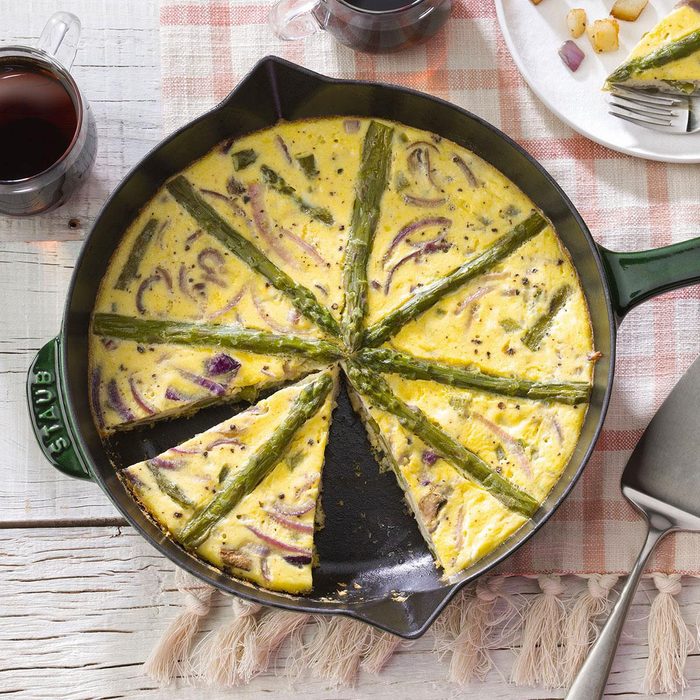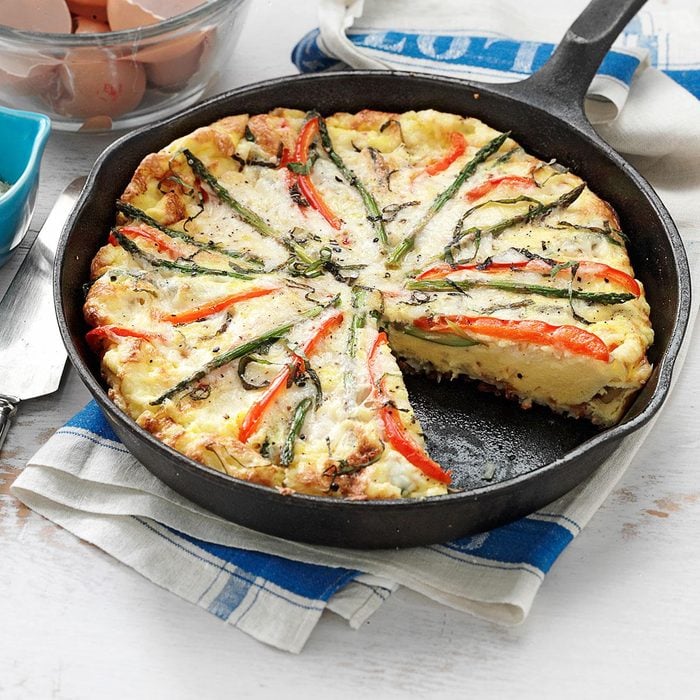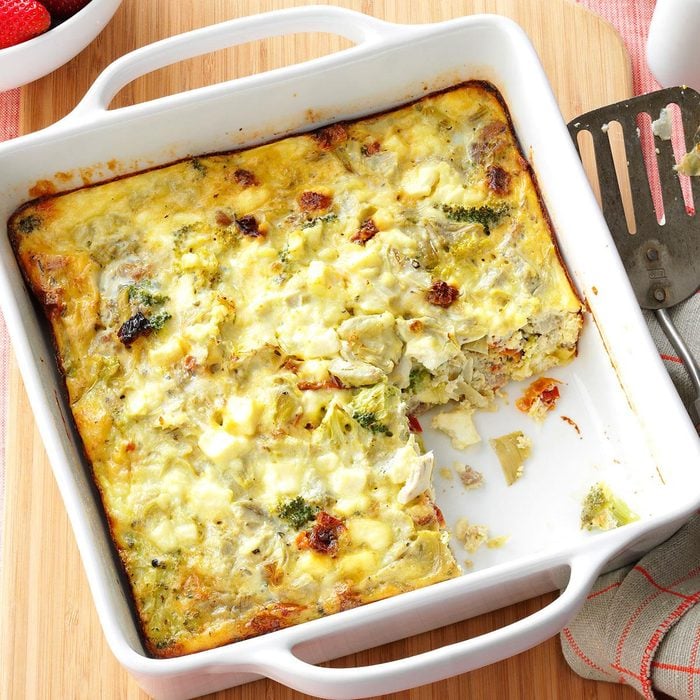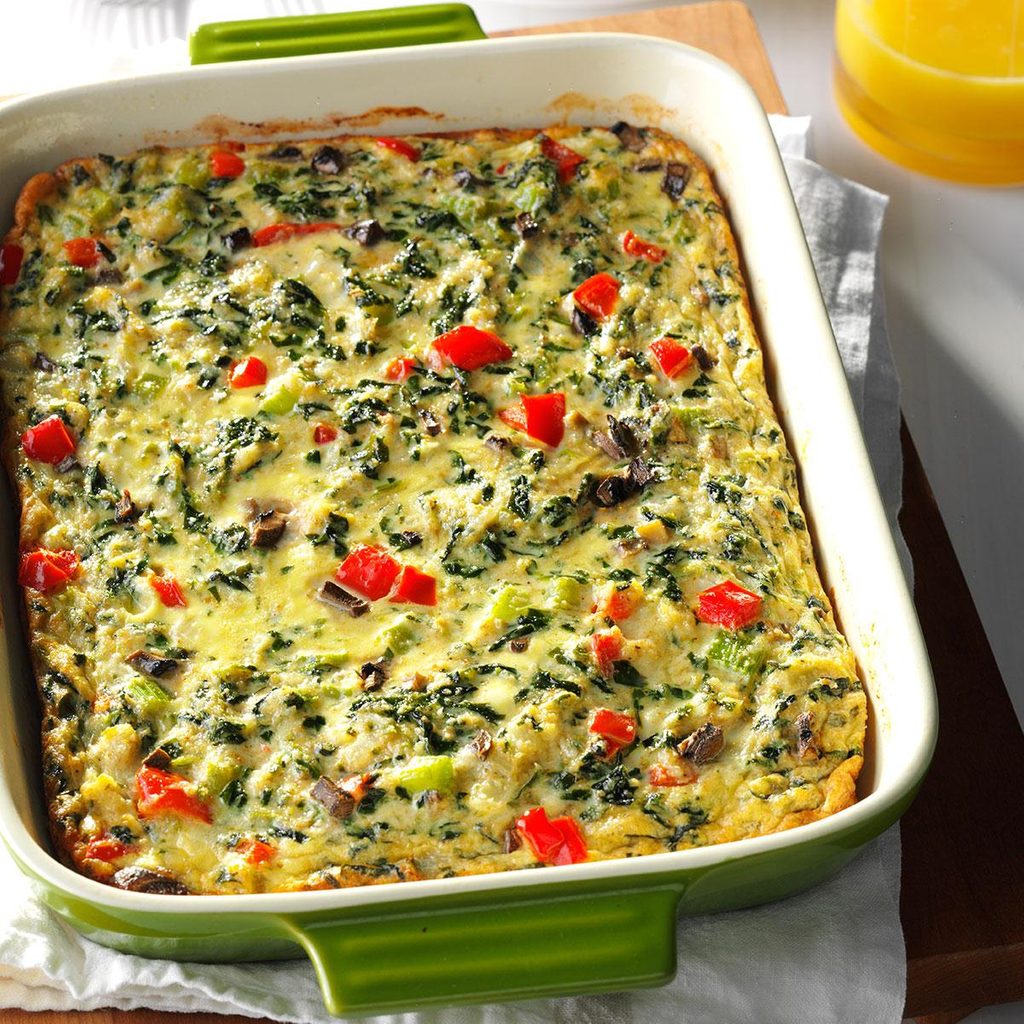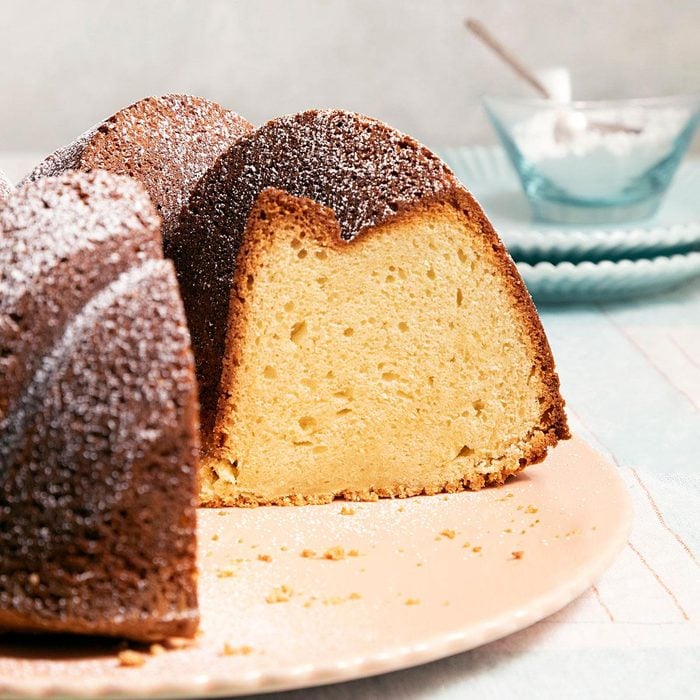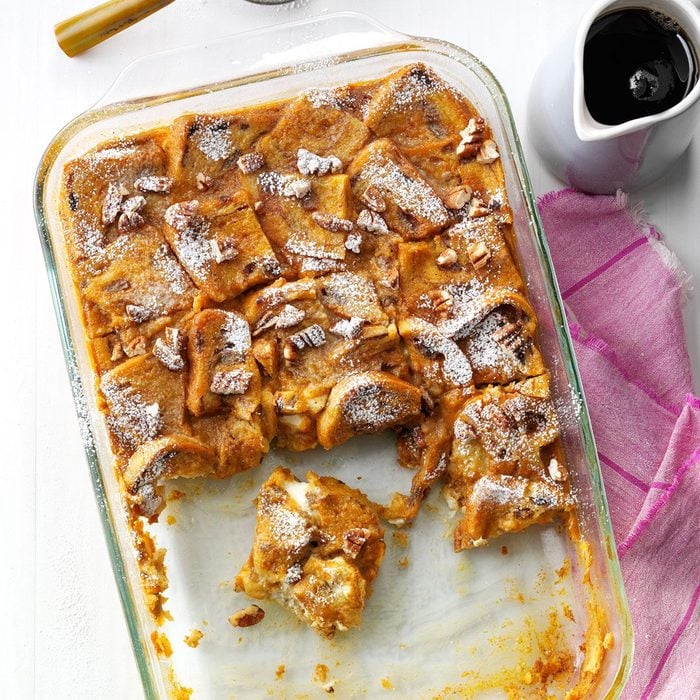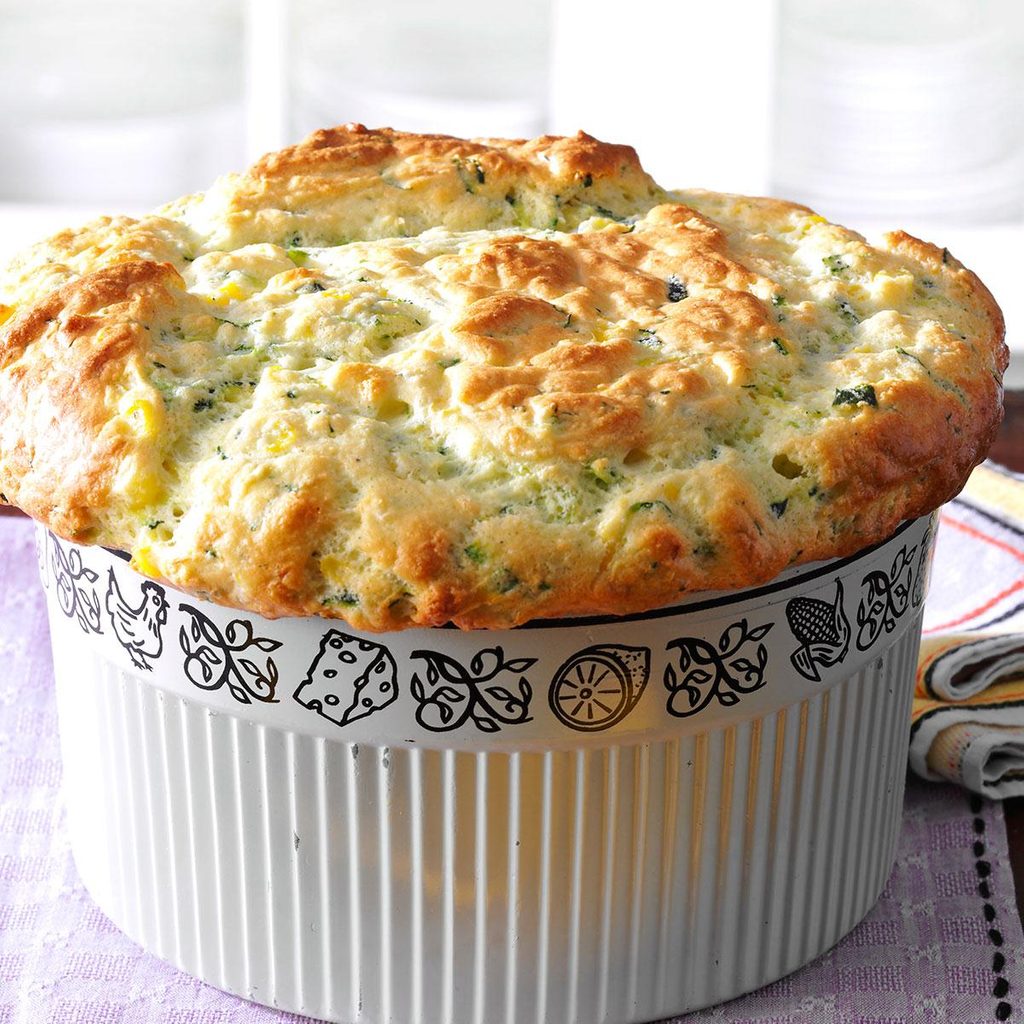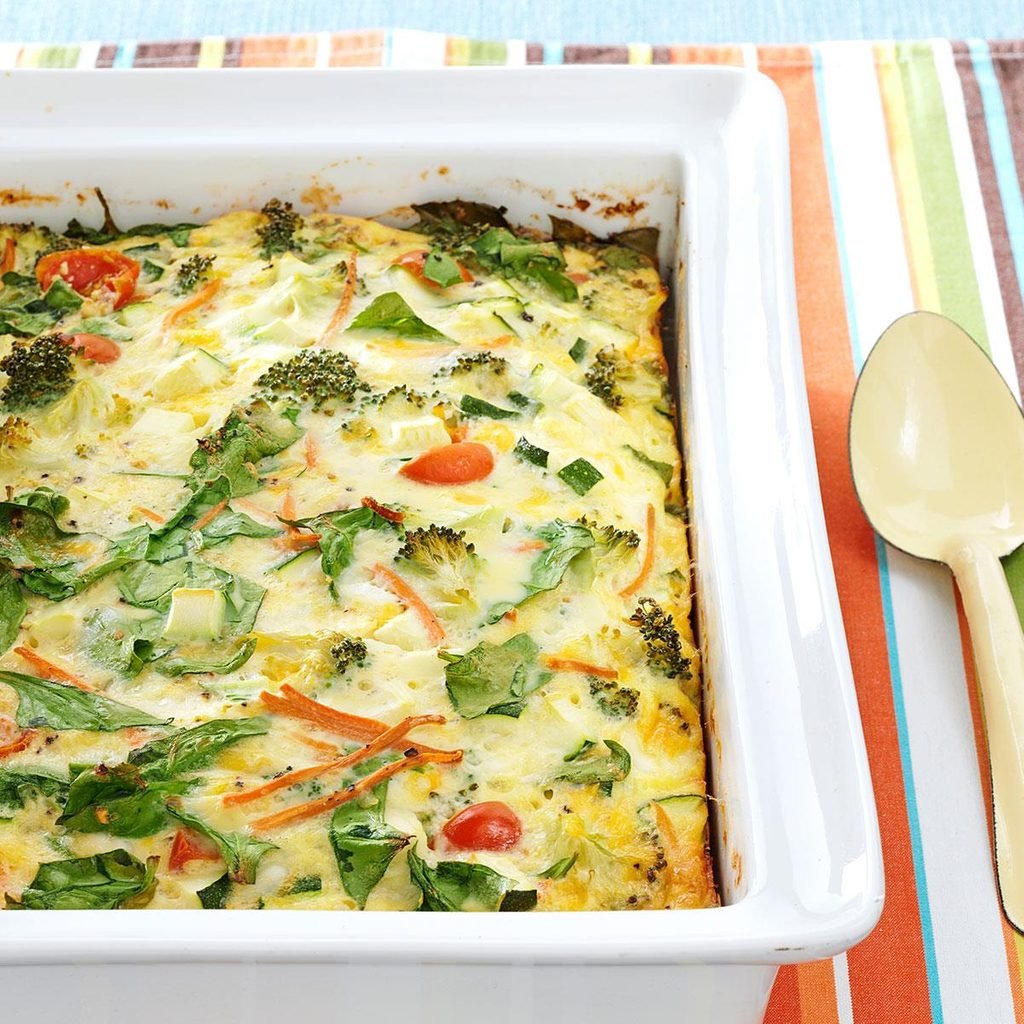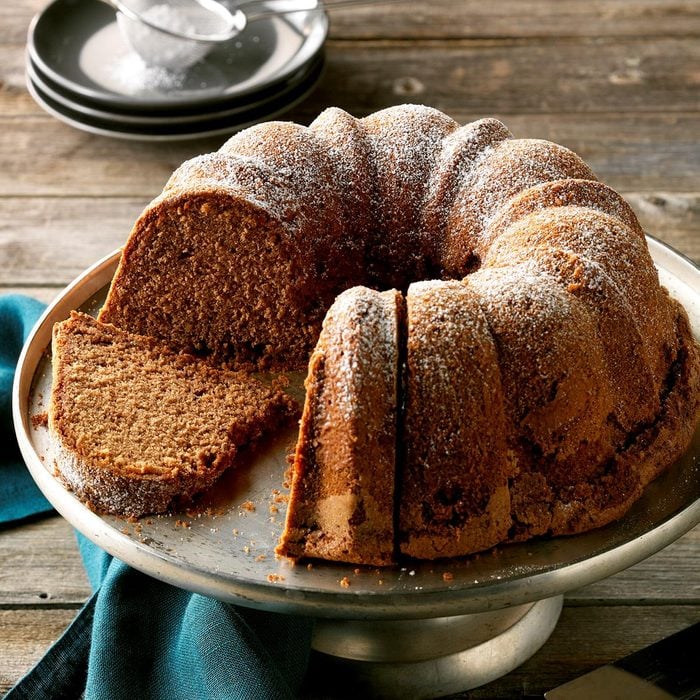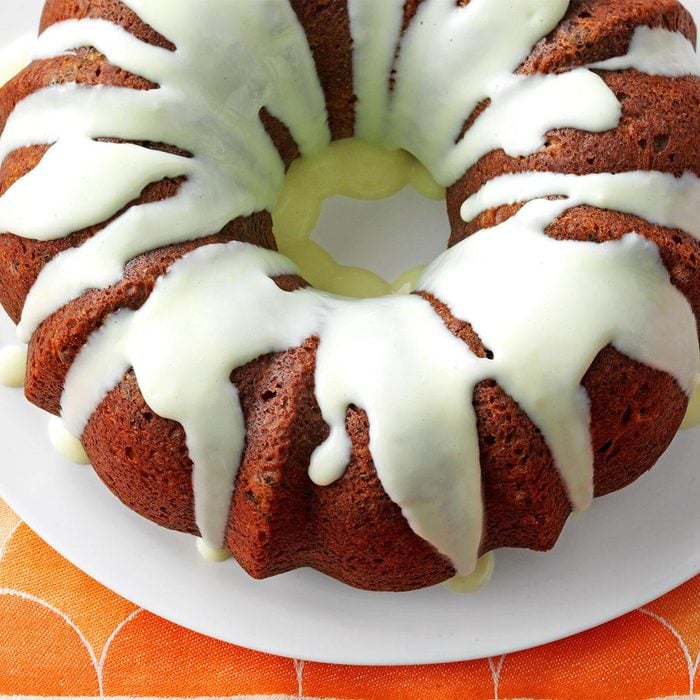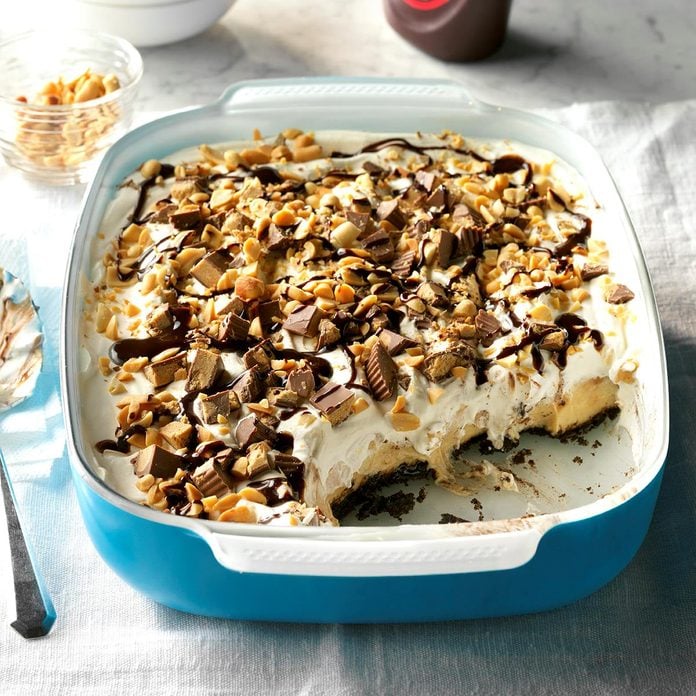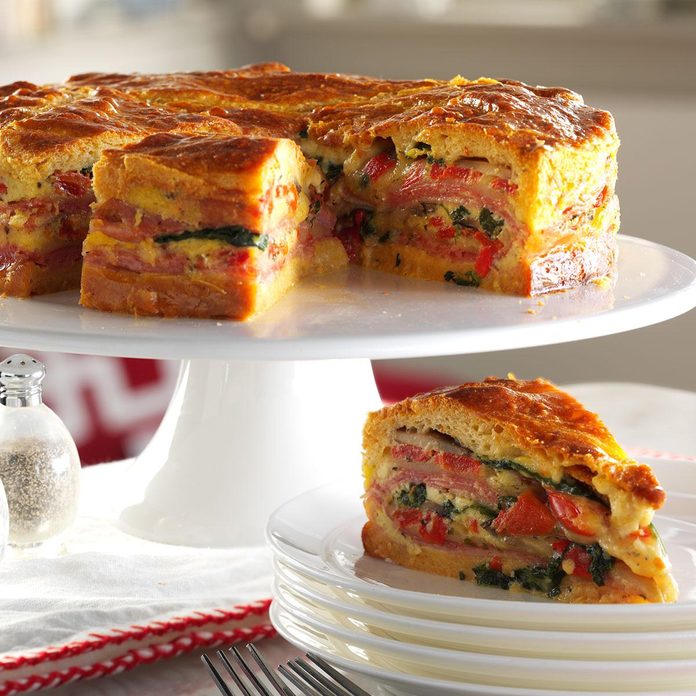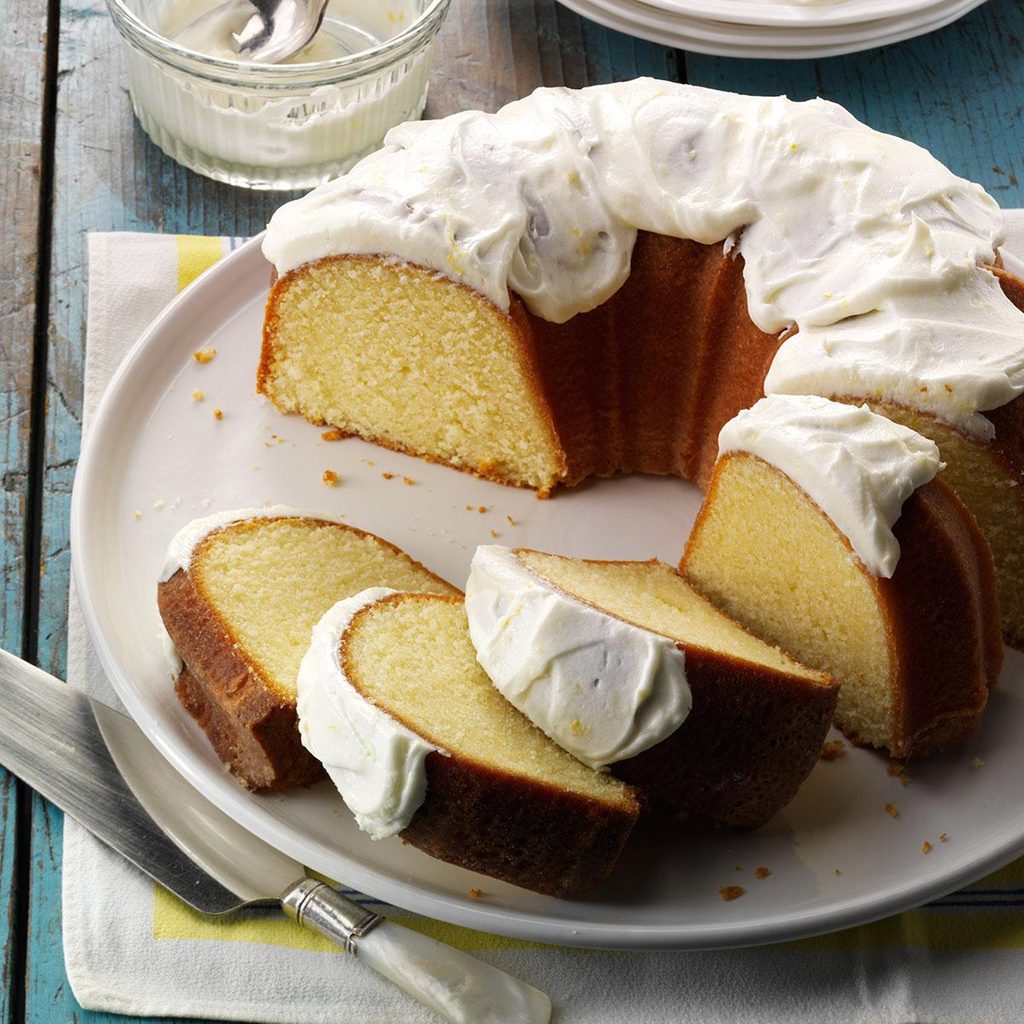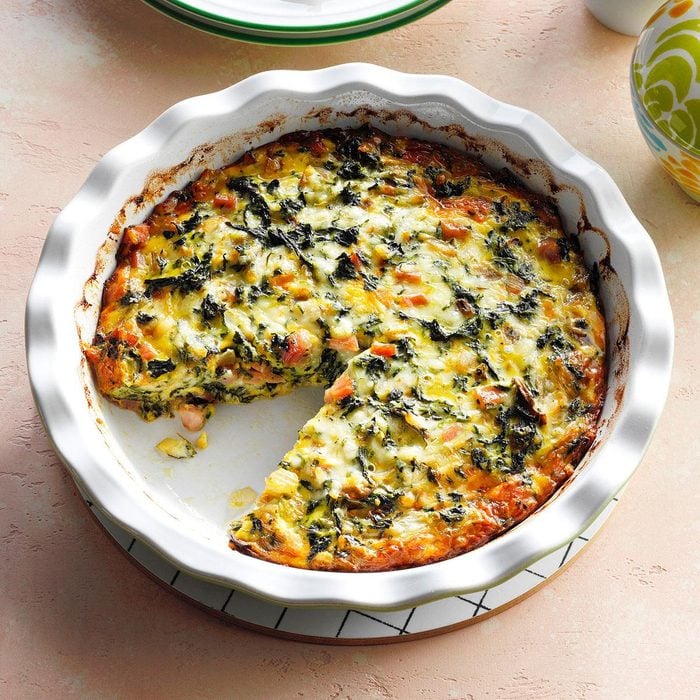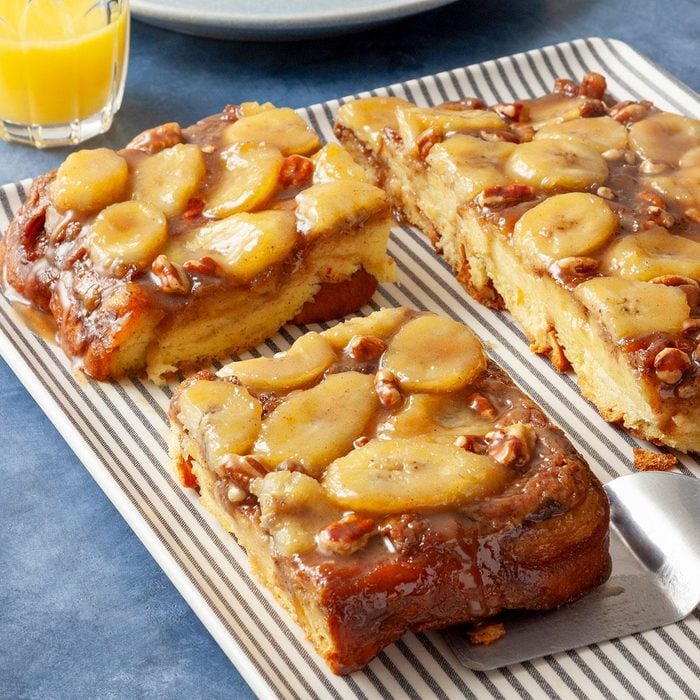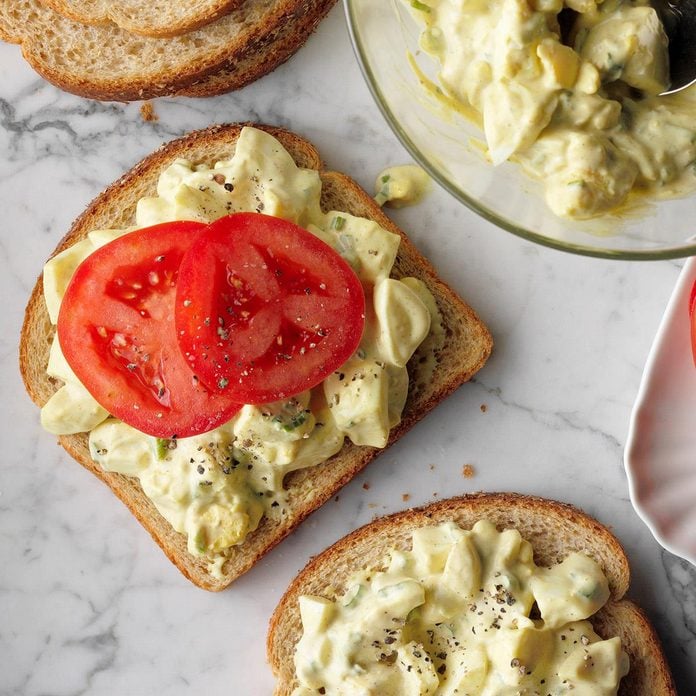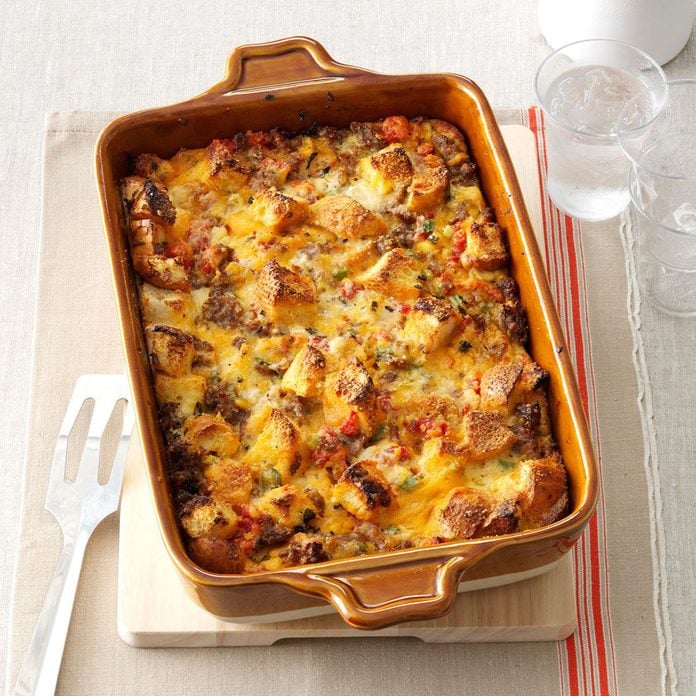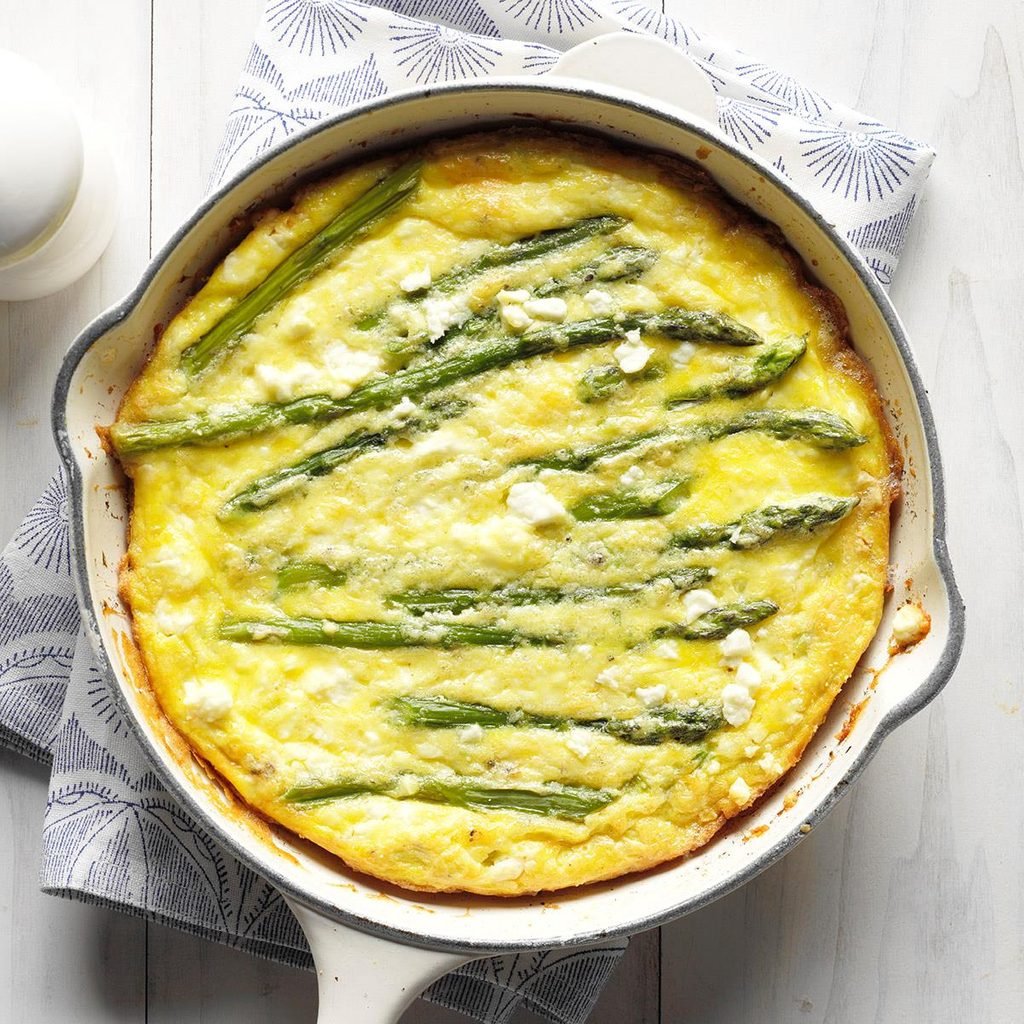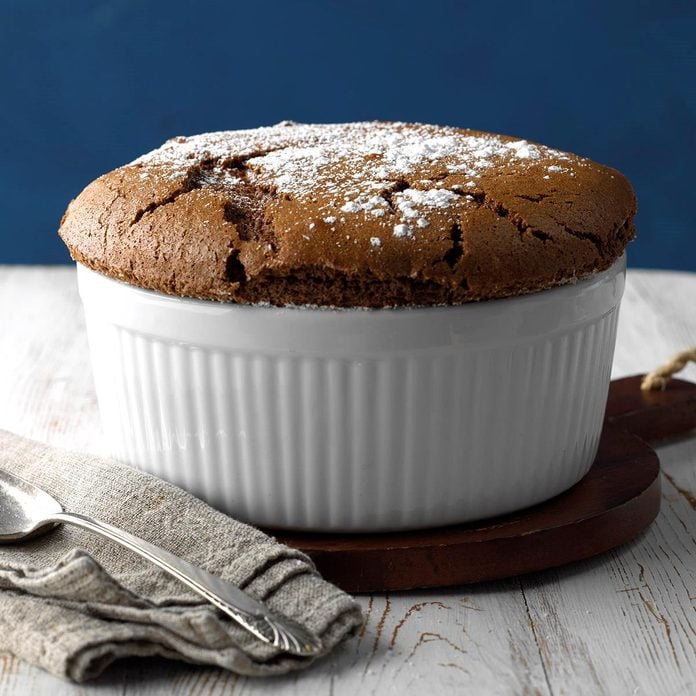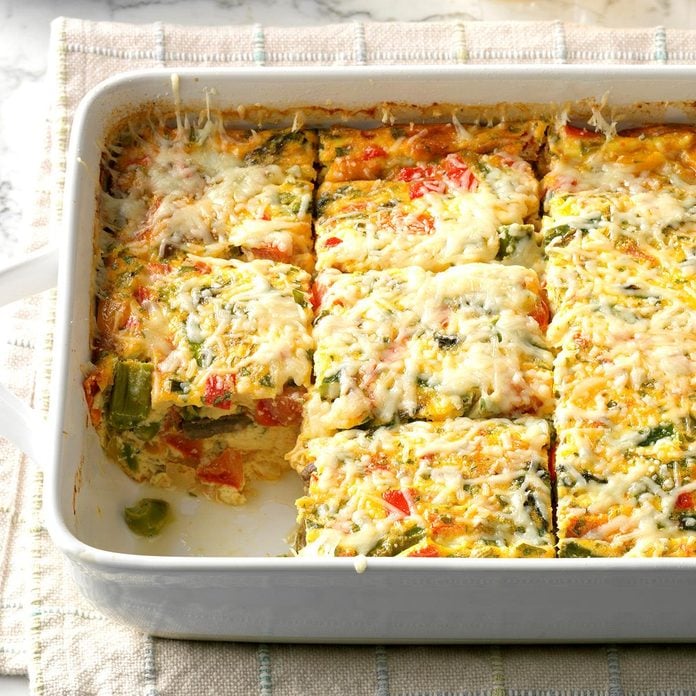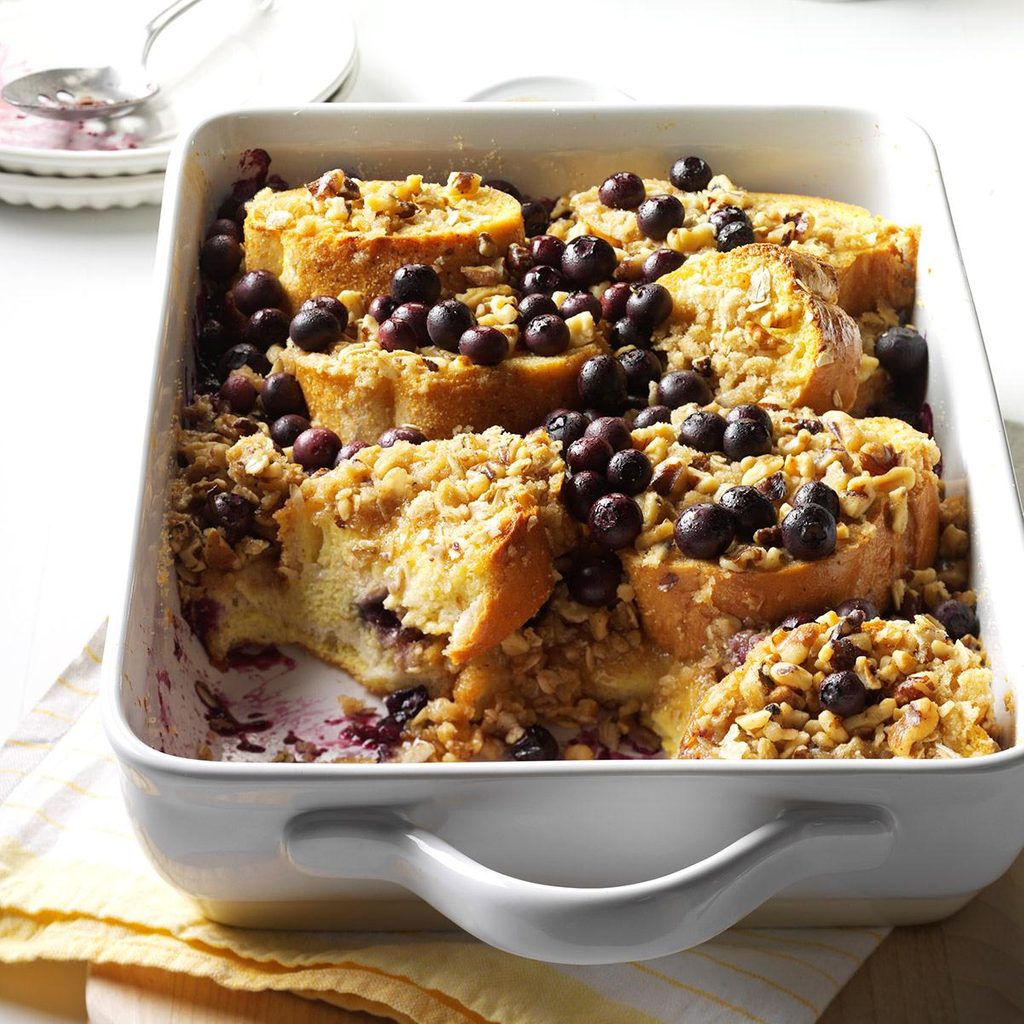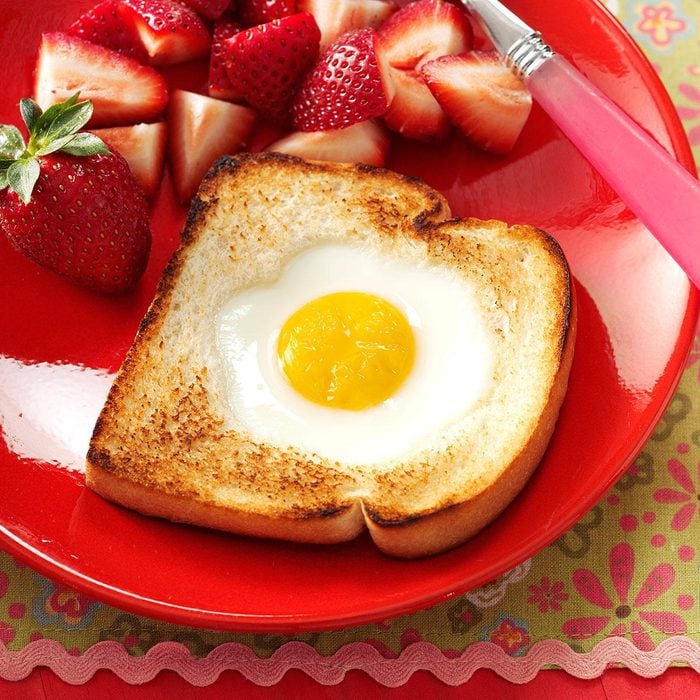Hash Brown Quiche CupsQuiche cups are my showstopper potluck dish. Hash browns and Asiago cheese make up the crusts. Eggs, spinach and bacon do the rest. —Nicole Stone, Gilbertville, Iowa
Not all eggs are equal.
Here's how to choose the best eggs for your recipe.
ShakshukaShakshuka is a dish of poached eggs with tomatoes, onion and cumin. I learned about it while traveling, and it's been my favorite way to eat eggs since. —Ezra Weeks, Calgary, Alberta
Egg Baskets BenedictA little puff pastry turns Canadian bacon and eggs into a tasty update on eggs Benedict. We use a packaged hollandaise or cheese sauce for the finish. —Sally Jackson, Fort Worth, Texas
Yogurt-Ricotta CheesecakeI have always liked Italian ricotta cheesecakes, but they have too much sugar for me. I made a light version, and my family couldn’t even tell the difference! I serve mine with sugar-free strawberry ice cream topping and fresh strawberries. —Diane Shipley, Mentor, Ohio
Also, try this humble-looking this
egg tart recipe all across from the Portugal.
Broccoli Ham QuicheThis rich ham and broccoli quiche is featured in a family cookbook I put together. My husband is proof that quiche can satisfy even a very healthy appetite. —Marilyn Day, North Fort Myers, Florida
Spaghetti with Eggs and BaconMost folks are surprised to see this combination of ingredients. But I usually make a big batch because it always disappears in a hurry.
Roasted Vegetable FrittataThe wonderful thing about frittatas is that I can make them with whatever I have available in my garden and in the pantry. This version uses spring produce to its fullest. Roasting really intensifies the natural sweetness of the asparagus and onion, and the earthiness of the potatoes. —Trisha Kruse, Eagle, Idaho
Arugula & Mushroom Breakfast PizzaIt's a challenge to be creative with breakfast every morning, and I like to come up with fun foods the kids will love. This is a great recipe for the kids to join in and help make for breakfast. You can also make and freeze it before you add the eggs, then finish baking another day. —Melissa Pelkey Hass, Waleska, Georgia
Creamy Pesto 'n Bacon Eggs BenedictOne of my favorite brunch dishes is eggs Benedict. While I adore the traditional version, I also have fun using other flavors. This is my Italian take using a semi-homemade creamy pesto sauce.—Jenn Tidwell, Fair Oaks, California
Breakfast TacosThis is a really simple, tasty breakfast. It has been a mainstay for our mornings together as a family. —Jo Ferguson, Arnold, Missouri
Egg-Topped Avocado ToastWe always have avocados on hand, so it's easy to make this quick breakfast toast for my husband and me. It's really tasty! —Kallee Krong-McCreery, Escondido, California
Honey ChallahI use these shiny, beautiful loaves as the centerpiece of my spread. I love the taste of honey, but you can also add chocolate chips, cinnamon, orange zest or almonds. Leftover slices of this sweet challah recipe work well in bread pudding or for French toast. —Jennifer Newfield, Los Angeles, California
Buffalo Chicken Deviled EggsMy daughter Sara loves spicy Buffalo chicken and deviled eggs, so I combined the two. Make and chill a day ahead so the flavors mingle. —Robin Spires, Tampa, Florida
Sesame Omelet Spinach SpiralsThese pretty spirals would be perfect for a buffet of international hors d'oeuvres. They remind me of sushi. The dipping sauce is an exotic accompaniment to this fun finger food.—Roxanne Chan, Albany, California
Old-Time Custard Ice CreamI think my most memorable summertime dessert for get-togethers has always been homemade ice cream. This recipe is so rich and creamy and is the perfect splurge on a hot summer afternoon. —Martha Self, Montgomery, Texas
Chorizo & Grits Breakfast BowlsWhile growing up, I bonded with my dad over chorizo and eggs. My fresh approach combines them with grits and black beans for this chorizo breakfast bowl. You can even add a spoonful of pico de gallo. —Jenn Tidwell, Fair Oaks, California
Gruyere and Egg BurgersThese burgers were a huge hit with our friends during football season. Regular mayo can easily be substituted for the garlic aioli if desired. —Melissa Pelkey Hass, Waleska, Georgia
Streusel-Topped Blueberry Waffle CasseroleI had company coming and needed a new breakfast casserole, so I made up this nutty idea using waffles. My neighbors and husband were happy taste testers. —Joan Hallford, Fort Worth, Texas
Corn Cakes with Poached EggsThese easy corn cakes are super tender thanks to the creamed corn in the batter. Top them with poached eggs and fresh salsa, and you get one of my favorite breakfasts. —Jamie Jones, Madison, Georgia
Coconut Pound Cake with Lime GlazeThis pound cake is the best! Oven temps will vary, so if the cake is not done after 1 hour and 20 minutes, continue baking in 5-minute intervals. Use fresh, not bottled, lime juice for the glaze. —Jo McFarland, Sterling, Virginia
Black Bean & White Cheddar FrittataThis is one of my favorite comfort foods for breakfast or even a quick dinner. I like to make it with lime salsa. But if you're looking for something with more kick, use hot salsa or add some chipotle pepper. —Aysha Schurman, Ammon, Idaho
Poached Eggs & PolentaWe have a bed and breakfast in Gettysburg where I serve creative dishes like these poached eggs with polenta, our twist on eggs Benedict.—Paulette Lee, Gettysburg, Pennsylvania
Rum Raisin Creme BruleeInspired by a favorite ice cream flavor, I created this make-ahead recipe to free up some time in the kitchen. You can also serve this as a custard if you choose to not caramelize the top. —Eleanor Froehlich, Rochester, Michigan
Mozzarella & Spinach Breakfast CasseroleSun-dried tomatoes and sausage add lots of texture and flavor to this gooey casserole. We've even enjoyed it reheated after a night game at our local college. It's always a winner in my book. —Nancy Murphy, Mount Dora, Florida
Curry ScrambleI have eggs every morning, and this is a delightful change from the classic scrambled egg meal. I like to add sliced peppers on top if I have them on hand. —Valerie Belley, St. Louis, Missouri
Basil Vegetable StrataI've been cooking this strata for years, and my family just can't get enough! Fresh basil gives the healthy brunch dish an added flavor boost. —Jean Ecos, Hartland, Wisconsin.
Sweet Potato and Egg SkilletI try to incorporate nutritious sweet potatoes in meals as often as possible, especially with breakfast. I came up with this recipe to feed my family a healthy, hearty breakfast—and it worked! —Jeanne Larson, Rancho Santa Margarita, California
Scrambled Egg BreadWe always eat ham, eggs and bread on camping trips, and we often have extras. Combine them and you’ve got scrambled egg bread. We first made this on a visit to Mount Shasta. —Shirley Mondeau, Rohnert Park, California
Eggnog Bread Pudding with CranberriesMy parents love this bread pudding loaded with cranberries and pecans – and it uses up leftover dinner rolls. For eggnog lovers, it makes a divine dessert. —Emily Hobbs, Springfield, Missouri
Cheese and Fresh Herb QuicheWith herbs from the garden to use, I created a quiche with basil, parsley and dill along with feta, Swiss, Gruyere and mozzarella. Goat cheese is also yummy. —Sonya Labbe, West Hollywood, California
Decadent Chocolate Crepe CakeNo other dessert has wowed family and friends the way this stunning crepe cake did the first time I made it. A showstopper in every sense of the word, it features layers of tender chocolate crepes and rich white chocolate buttercream frosting draped in a semisweet chocolate ganache. —Tina Sawchuk, Ardmore, Alberta
Bacon-Sausage Quiche TartsAs a teacher, I attend many meetings and also have special celebrations with rest of the staff. The other teachers are very fond of this treat and often request that I bring it to our functions. —Jackie Milliken, Pittsboro, North Carolina
Chorizo and Eggs RancheroFor a festive Mexican breakfast, we do chorizo and huevos rancheros. Add refried beans and cheddar, and serve everything in bowls made of tortillas. —Paul Williams, Fort Mohave, Arizona
Brunch Hash & Egg BakeWhen my kids were growing up, I was cooking for eight. I couldn't conveniently fry eggs for that many people, so I devised this recipe that became a family favorite. Mild and salty feta cheese is my favorite for the dish, but shredded cheddar or Parmesan work, too. —Lily Julow, Lawrenceville, Georgia
Asparagus-Mushroom FrittataMy Sicilian Aunt Paulina inspired this fluffy frittata. I remember visiting her garden, picking fresh veggies and watching her cook. Her wild asparagus frittata was my favorite. —Cindy Esposito, Bloomfield, New Jersey
Onion TartOnion lovers are sure to be asking for second helpings of this appetizing tart—it uses two kinds of onions! Parmesan and feta cheese, nutmeg and hot pepper sauce enhance the flavor nicely. With its quichelike filling, the dish is ideal for a brunch or buffet. -Christine Andreas, Huntingdon, Pennsylvania
Eggs Benedict with Homemade HollandaiseLegend has it that poached eggs on an English muffin started at Delmonico’s in New York. Here’s my take on this brunch classic, and don’t spare the hollandaise. —Barbara Pletzke, Herndon, Virginia
Slow-Cooker Chorizo Breakfast CasseroleMy kids ask for this hearty slow-cook casserole for breakfast and dinner. You can serve it with salsa or white country gravy. It’s delightful either way. —Cindy Pruitt, Grove, Oklahoma
Veggie Omelet with Goat CheeseMy family eats a lot of vegetables so I'll set some aside at dinner to use in an omelet the next day. This cuts prep time in half! I like the versatility of this recipe because it can be made with whatever veggies and cheeses you have. —Lynne Keast, Monte Sereno, California
Hearty Slow-Cooker Breakfast HashThis sweet and savory hash certainly won't leave you hungry—the sausage, veggies and eggs will fill you up. The hint of maple syrup makes it all feel extra cozy. —Colleen Delawder, Herndon, Virginia
Asparagus and Red Pepper FrittataWhat a tasty way to start a morning! This frittata is enriched with asparagus, potatoes, peppers, herbs and a wonderful blend of cheeses. Serve with a side of seasonal fruit. —Toni Donahue, Westerville, Ohio
Greek Breakfast CasseroleThis is a great dish for a Sunday brunch, or you can cut it into six pieces and freeze it to have as a quick and easy breakfast any day of the week. I also like to make it with broccoli, carrots, green onions, Canadian bacon and sharp cheddar cheese; the variations are nearly endless! —Lauri Knox, Pine, Colorado
Vegetable FrittataWhen you're looking for something healthy in a hurry, you can't beat this vegetable frittata cooked in a cast-iron skillet. —Janet Eckhoff, Woodland, California
Crab-Spinach Egg CasseroleI've developed a strong interest in cooking over the years. As a matter of fact, I came up with this casserole as a special breakfast for our daughter when she was home for a visit. —Steve Heaton, Deltona, Florida
Sour Cream Pound CakeBecause I'm our town's postmaster, I can bake only in my spare time. I especially enjoy making desserts such as this one. It tastes amazing as is, or tuck it under ice cream and chocolate syrup like a hot fudge sundae! —Karen Conrad, East Troy, Wisconsin
Horseradish Deviled EggsPeople say "Wow!" when they taste these flavorful, tangy horseradish deviled eggs. The bold combination of ground mustard, dill and horseradish is so appealing. The plate is always emptied when I serve these eggs. —Ruth Roth, Linville, North Carolina
Cheddar-Veggie Appetizer TorteA line forms quickly behind this quichelike torte at family gatherings. The wedges are easy to eat as finger food, and it's delicious hot or cold. — Barbara Estabrook, Rhinelander, Wisconsin
Gluten-Free Potato SaladIn college, my best friend and I debated whose mom made the best potato salad. Turns out they were almost identical! Even though I've since tweaked our recipe, this gluten-free potato salad still takes me home again. —Ellie Martin Cliffe, Milwaukee, Wisconsin
Calico Scrambled EggsWhen you're short on time and scrambling to get a meal on the table, this recipe is just what you need. There's a short ingredient list, cooking is kept to a minimum. and the green pepper and tomato makes it colorful. —Taste of Home Test Kitchen
Veggie Nicoise SaladMore and more people in my workplace are becoming vegetarians. When we cook or eat together, the focus is on fresh produce. This salad combines some of our favorite ingredients in one dish—and with the hard-boiled eggs and kidney beans, it delivers enough protein to satisfy those who are skeptical of vegetarian fare. —Elizabeth Kelley, Chicago, Illinois
Overnight Pumpkin French Toast CasseroleRecipes that don't tie me to the kitchen—that’s what I’m all about. I make this luscious dish the night before breakfast or brunch with guests. —Patricia Harmon, Baden, Pennsylvania
Zucchini & Sweet Corn SouffleAs novice gardeners, my husband and I sowed zucchini seeds—15 hills' worth! Happily, my family requests this corn souffle side dish often, so it's a keeper. —Carol Ellerbroek, Gladstone, Illinois
Baked French Toast with StrawberriesFrench toast is a crowd-pleaser, but it's hard to make for a big group. This overnight casserole with strawberries and a sweet pecan topping fixes everything. —David Stelzl Jr., Waxhaw, North Carolina
Creamy Strawberry CrepesWrap summer-ripe strawberries and creamy filling into these delicate crepes for an elegant brunch entree. —Kathy Kochiss, Huntington, Connecticut
Garden Veggie Egg BakeLooking for a healthy day-starter? Children will actually enjoy eating their veggies when they’re baked into this cheesy, nutrition-packed egg dish. —JoAnne Wilson, Roselle Park, New Jersey
Chocolate Pound CakeYou'll find that this cake goes well with ice cream, but it's also delicate enough to serve in small pieces with tea. —Ann Perry, Sierra Vista, Arizona
Sausage & Crescent Roll Breakfast CasseroleI made this tasty sausage and crescent roll breakfast casserole for a baby shower. It saved the day: Preparing it ahead gave me more time to finish decorating for the party. —Melody Craft, Conroe, Texas
Cheddar-Ham Oven OmeletWe had a family reunion for 50 relatives from the U.S. and Canada, and it took four pans of this hearty five-ingredient omelet to feed the crowd. Fresh fruit and an assortment of muffins helped round out our brunch menu. —Betty Abrey, Imperial, Saskatchewan
Egg BurritosZap one of these frozen burritos in the microwave and you'll stave off hunger all morning. This recipe is my family’s favorite combo, but I sometimes use breakfast sausage instead of bacon. —Audra Niederman, Aberdeen, South Dakota
Creamy Egg SaladI love the versatility of this creamy egg salad. You can serve it on a nest of mixed greens, tucked into a sandwich or with your favorite crisp crackers. —Cynthia Kohlberg, Syracuse, Indiana
Chocolate Zucchini Cake with Custard SauceThe minute I can get my hands on zucchini, I start making this light and luscious cake. For years it was an often-ordered dessert at my sister's deli. —Peggy Linton, Cobourg, Ontario
Peanut Butter Custard Blast"Ooey, gooey, great!" is how friends and family describe this chocolate-peanut butter dessert. I appreciate the make-ahead convenience. —Marilee Evenson, Wisconsin Rapids, Wisconsin
Italian Brunch TorteWe always serve this impressive layered breakfast bake with a salad of mixed greens and tomato wedges. It is one of our most requested dishes and can be served warm or cold. —Danny Diamond, Farmington Hills, Michigan
Breakfast Egg MuffinsAfter enjoying scrambled egg muffins at a local restaurant, I came up with this breakfast egg muffins recipe that my husband likes even better. They're pretty, hearty and fun to serve, too. —Cathy Larkins, Marshfield, Missouri
Lemon Pound CakeCitrus trees grow abundantly in California, and I'm always looking for new recipes which use the fruit from the orange and lemon trees in my yard. This lemon pound cake is one of my favorites! My mother passed this recipe down to me. —Richard Killeaney, Spring Valley, California
Crustless Spinach QuicheI served this crustless quiche at a church lunch, and I had to laugh when one guy told me how much he disliked vegetables. Many people were surprised by how much they loved this veggie-filled quiche recipe—and he was one of them! —Melinda Calverley, Janesville, Wisconsin
Bananas Foster French ToastMmm…bananas Foster for breakfast! This yummy baked French toast serves up all the taste of the spectacular dessert in fine fashion. —Laurence Nasson, Hingham Massachusetts
Country Brunch SkilletUsing frozen hash browns and packaged shredded cheese shaves minutes off the prep time of this skillet egg dish, making it an appealing meal you can put together quickly. —Elvira Brunnquell, Port Washington, Wisconsin
Picante Omelet PieThis zippy egg bake is a favorite of one of my daughters. She comes for brunch every week before church, so I serve it often.—Phyllis Carlson, Gardner, Kansas
Curried Egg SaladA curry kick gives this egg salad big appeal. We love it when the weather gets warm. —Joyce McDowell, West Union, Ohio
Hash Brown Nests with Portobellos and EggsHash browns make a fabulous crust for these individual egg quiches. They look fancy yet they're easy to make. They've been a hit at holiday brunches and other special occasions.—Kate Meyer, Brentwood, Tennessee
Tomato, Sausage & Cheddar Bread PuddingThis savory dish is the perfect excuse to have bread pudding as the main meal, not merely afterward as dessert. — Holly Jones, Kennesaw, Georgia
Feta Asparagus FrittataAsparagus and feta cheese come together to make this frittata extra special. It's perfect for a lazy Sunday or to serve with a tossed salad for a light lunch. —Mildred Sherrer, Fort Worth, Texas
Hot Cocoa SouffleA friend invited me to go to a cooking demo at her church years ago, and one of the recipes prepared was this luscious souffle. It was so easy—and absolutely delicious. —Joan Hallford, North Richland Hills, Texas
Breakfast LoafI love to make this mile-high breakfast sandwich when we have company for the weekend. If you'd like, add sliced mushrooms and olives. —Amy McCuan, Oakley, California
Fluffy Scrambled EggsWhen our son, Chris, wants something other than cold cereal in the morning, he whips up these eggs. Cheese and evaporated milk make them especially good. They're easy to make when you're camping, too. —Chris Pfleghaar, Elk River, Minnesota
Colorful Brunch FrittataA friend called and asked me for a special recipe that he could serve at his daughter's wedding brunch. I created this brunch frittata recipe for the special day. —Kristin Arnett, Elkhorn, Wisconsin
Mediterranean Broccoli & Cheese OmeletMy Italian mother-in-law taught me to make this omelet years ago—she would make it for breakfast, lunch or dinner and eat it on Italian bread. This is one of my favorite ways to use up leftover broccoli. —Mary Licata, Pembroke Pines, Florida
Eggsquisite Breakfast CasseroleI developed this recipe over 20 years ago. The rich warm sauce tastes especially great on cold winter mornings. I hope your family enjoys it as much as mine! — Bee Fischer, Jefferson, Wisconsin
Blueberry Crunch Breakfast BakeBlueberries in season make this a very special breakfast, but I find that frozen berries can work just as well. My grandmother used to make this with strawberries and I always loved to eat it at her house.—Marsha Ketaner, Henderson, Nevada
Sausage, Egg and Cheddar Farmers BreakfastThis hearty combination of sausage, hash browns and eggs is just right for any breakfast. &mdash:Bonnie Roberts, Newaygo, Michigan
Cream Cheese & Chive OmeletThe first bite of creamy filling lets you know this isn’t any old omelet. Make it once, and we suspect you’ll be fixing it often. —Anne Troise, Manalapan, New Jersey
Lemon-Blueberry Pound CakePair a slice of this moist lemon-blueberry cake with a scoop of vanilla ice cream. It's a staple at our family barbecues. —Rebecca Little, Park Ridge, Illinois
Oven Denver OmeletI like omelets but don't always have time to stand by the stove. That's why I favor this oven-baked variety that I can quickly pop into the oven at a moment's notice. My family frequently requests this for Sunday brunch. They always empty the dish. —Ellen Bower, Taneytown, Maryland
Mini Sausage QuichesThese bite-sized quiches are loaded with sausage and cheese—and all nestled into easy crescent roll dough. Serve the cute muffinettes at any brunch or potluck gathering. —Jan Mead, Milford, Connecticut
Bacon and Egg CasseroleBecause it's fast to fix and such a great hit with family and friends, this egg casserole with bacon is a favorite of mine to make for brunches. Served with a fruit salad, hot muffins and croissants, it's excellent for an after-church meal. —Deanna Durward-Orr, Windsor, Ontario
Sausage Egg BakeThis hearty egg dish is wonderful for any meal of the day. I fix it frequently for special occasions, too, because it's easy to prepare and really versatile. For a change, use spicier sausage or substitute a flavored cheese blend. -Molly Swallow, Pocatello, Idaho
Toad in the HoleAmerican Toad in a hole is one of the first recipes I had my children prepare when they were learning to cook. Much easier than the European version, this fun egg-in-a-hole is sure to please. My "little ones" are now grown (and have advanced to more difficult recipes!), but this continues to be a traditional standby in my home and theirs. —Ruth Lechleiter, Breckenridge, Minnesota
Cheesy Egg PuffsMy father loves to entertain, and these buttery egg delights are one of his favorite items to serve at brunch. The leftovers are perfect to reheat in the microwave on busy mornings, so Dad always stashes a few aside for me to take home once the party is over. —Amy Soto, Winfield, Kansas
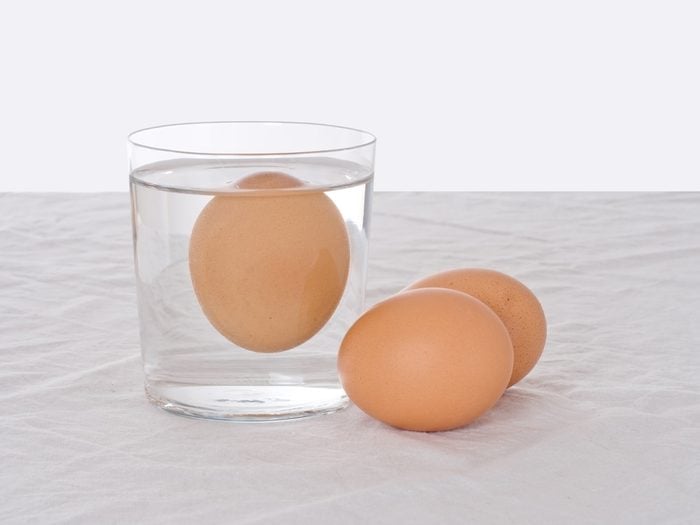 Sarah2/Shutterstock
Sarah2/Shutterstock
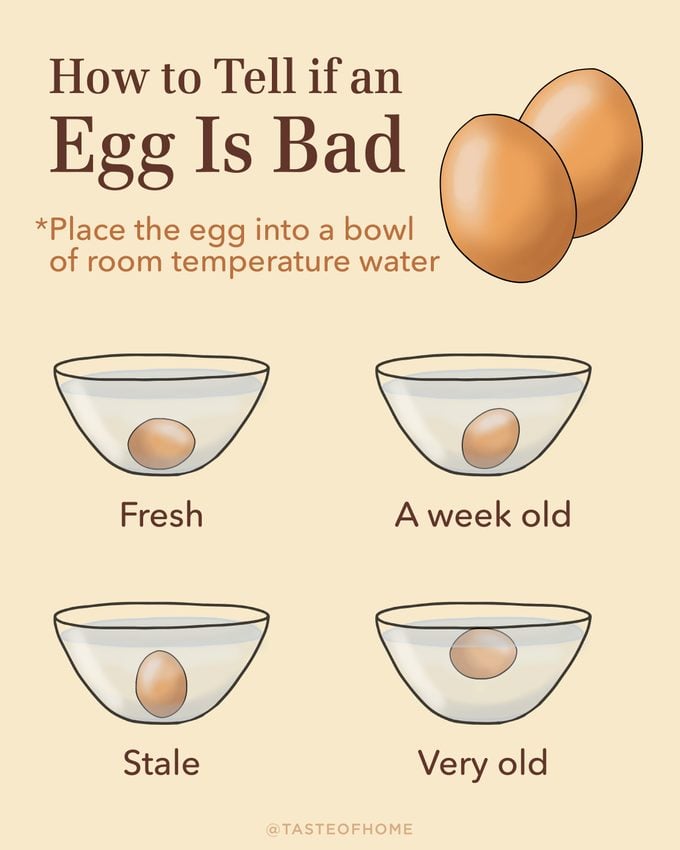 Taste of Home
Taste of Home


